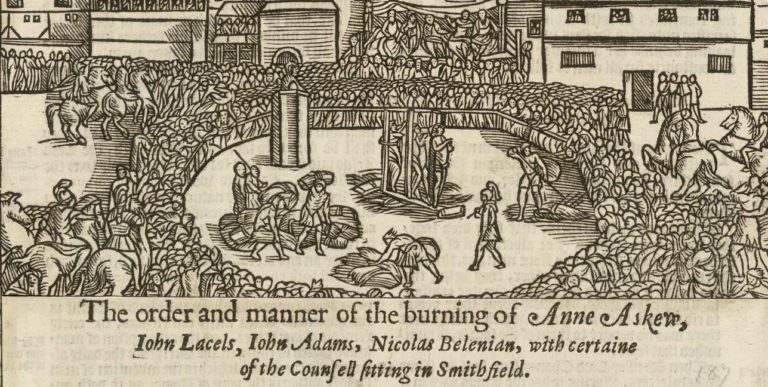Every death, every disappointment, every illness, any suffering, any frustration, any loss, any regret, any pain that we experience is a gracious judgment of God. And every one of God’s gracious judgments is a message from God, a wake-up call from God. For every one of them:
- reminds us that we live in a fallen world with all its frustrations (Rom 8:18-23);
- reminds us of the sinfulness of humanity and our own sinfulness, and calls us to repent (Luke 13:1-5);
- reminds us not to put our hopes in this world, but to desire to depart and be with Christ (Phil 1:23);
- reminds us to worship God with reverence and awe (Heb 12:26-29);
- reminds us to suffer with Christ now, that we may be glorified with him when he returns (1 Pet 4:12,14);
- reminds us of the priority of evangelism (2 Pet 3:9);
- reminds us that one day we will set aside the ‘earthy tent’ of our body, that we may be ‘further clothed’ in our ‘heavenly dwelling’ (2 Cor 5:1-4);
- reminds us to pray fervently for the return of Christ (Rev 22:20);
- reminds us to set our hope fully on the grace that Christ will bring us when he returns (1 Pet 1:13);
- reminds us that one day we will face the judgment of God and of Christ (Rev 20:12, 2 Cor 5:10);
- reminds us of the future glories of the new Jerusalem, the bride of the Lamb (Rev 21,22).
Are not each of these messages that we desperately need today? These gracious judgments can equally well be described as ‘severe mercies’.
They are God’s messages to those who do not trust in Christ that they should turn to him in repentance and faith. They are God’s messages to his people that they to should repent, and live in the light of the return of Christ, and be ‘in the world’, but not ‘of the world’ (John 17:15-18). These are judgments of God, disciplines from which we should profit, and signs of God’s love, sever mercies (Heb 12:7-11).
These gracious judgments can be described as ‘severe mercies’. They are God’s messages to those who do not trust in Christ that they should turn to him in repentance and faith. They are God’s messages to his people that they live in the light of the return of Christ
God can use agents for his acts of judgment, God can use accidents for his acts of judgment, God can use the fallenness of the world and the fallenness of humanity for his acts of judgment. God can act directly, without using any means. The message is the same.
Reading COVID-19 in the Light of Luke 13
Just think of Luke 13:13:1-5, in the light of the parable in vv6-9.
Now there were some present at that time who told Jesus about the Galileans whose blood Pilate had mixed with their sacrifices. Jesus answered, “Do you think that these Galileans were worse sinners than all the other Galileans because they suffered this way? I tell you, no! But unless you repent, you too will all perish. Or those eighteen who died when the tower in Siloam fell on them—do you think they were more guilty than all the others living in Jerusalem? I tell you, no! But unless you repent, you too will all perish.”
Then he told this parable: “A man had a fig tree growing in his vineyard, and he went to look for fruit on it but did not find any. So he said to the man who took care of the vineyard, ‘For three years now I’ve been coming to look for fruit on this fig tree and haven’t found any. Cut it down! Why should it use up the soil?’
“‘Sir,’ the man replied, ‘leave it alone for one more year, and I’ll dig around it and fertilize it. If it bears fruit next year, fine! If not, then cut it down.’” (NIV 11).
Were those Galileans slaughtered by Pilate, mixing their blood with their sacrifices, worse sinners than other Galileans? Jesus says, ‘No, I tell you; but unless you repent, you too will all perish.’
What of those who died when the Siloam tower fell? Were they worse sinners than the rest of the people in Jerusalem? Jesus says, ‘No, I tell you; but unless you repent, you too will all perish.’
Some died by human hatred (Pilate’s hatred). Some died, as when the tower of Siloam fell) because of an accident (or bad building, earth tremor, lack of maintenance?) But Jesus’ message is the same: ‘repent, or you too will all perish.’
Some died by human hatred. Some died, as when the tower of Siloam fell) because of an accident. But Jesus’ message is the same: ‘repent, or you too will all perish’.
And in the following parable (vv6-9) of the tree which did not bear fruit, the day of judgment was just a year away: ‘then you cut it down’ (v9). Now is the day of opportunity to repent: it will not last forever.
Notice too that the people who died were not worse sinners than everyone else. In God’s general judgments, we cannot make the easy connection between sin and suffering. Here are particular judgments with a general message: ‘repent, or you too will all perish’. Those who suffer and die in COVID-19 are not worse sinners. We have no authority to link the particular sins they have committed to their suffering and death.[1] Their suffering and/or death is a warning to all. ‘You will all perish.’
These are God’s judgments, because he is the sovereign ruler of the universe, and nothing happens outside his control. He uses human agents, the fallenness of the world, sinful humans, and also acts directly: but he makes use of these events to shock us into repentance.
They are ‘judgments’, designed to shock us into repentance, to urge us to give up our petty idolatries, to each us patience and endurance, to demonstrate our faithfulness, and to give us opportunities to love and serve others.
They are ‘gracious judgments’ because they show us God’s kindness and patience with us, his loving discipline of us, and his warning to everyone to repent. They show God’s love as well as warning of the Great Judgment on the last day.
For:
- all of us must appear before the judgment seat of Christ, so that each may receive recompense for what has been done in the body, whether good or evil (2 Cor 5:10).
- and I saw a great white throne, and one seated on it … and the dead were judged according to their works … (Rev 20:12).
How kind of God to send us small ‘gracious judgments’ now, in order to warn us of the Great Judgment, when Christ returns. They are ‘severe mercies’.
And the fact that God is using this ‘gracious judgments’ does not mean that we should not lovingly care for those who are suffering, try to avoid spreading the disease, praying for those in need, and working to find a vaccination. But we should also see Covid 19 as one of God’s gracious judgments: we should beg for his mercy, repent, and call on others to repent as well.
I recently received a letter from Christopher Ash, which included this message, reproduced with his permission.
“Be on guard, keep awake…to stay awake. Therefore stay awake… And what I say to you I say to all: Stay awake.” (Mark 13:29, 33-36).
COVID-19 is a sign that Jesus will return soon. I’ve read so many excellent blog posts about the virus, so so many, full of wisdom and insight; so much good stuff about how to love neighbour as self, how to love one another, with wisdom from Luther, Spurgeon, and so on. And I wondered what I could possibly say in this prayer letter. So I thought I’d go for this:
COVID-19 is a sign that Jesus will return soon.
Whoa! I hear some of you saying. I always suspected Christopher was a bit odd; now he has gone completely dotty. He has joined the ranks of the weirdos and loonies … And yet I think it is true. Oh, sure, we don’t know and can’t know when Jesus will return (v. 32); so there is no profit in speculating. But is it not true that each “war” or “rumour of war,” each plague, every trouble of this age is a sign that the Lord Jesus will return in power and glory soon? It is always soon. COVID19 is no more a sign than the Black Death in the fourteenth-century, the Great Plague of 1666, or the Spanish ‘flu a century ago; but it is also no less a sign. In its terror, its shaking of our world, it brings home to us that this age can never be our home, and that the risen and ascended Jesus will most surely return. Hallelujah! In that we have hope.
So how ought we to live in these strange days? “Keep awake!” says the Lord Jesus again and again and again. I take it (from Romans 13:11-14) that means striving to repent daily and live a godly life, putting on the Lord Jesus Christ day by day in our new circumstances; perhaps that’s a special word for us cooped up and thrown together more than we usually would be with. And separated from many we would dearly love to see, sit with, hug, and care for. And I take it (perhaps not least from the Garden of Gethsemane which follows so soon after this, Mark 14:32-42) that to stay awake means to be alert and disciplined in our prayers.
Amen! Come, Lord Jesus.
[1] We cannot generalise, when we have no knowledge of the individuals who have died.















